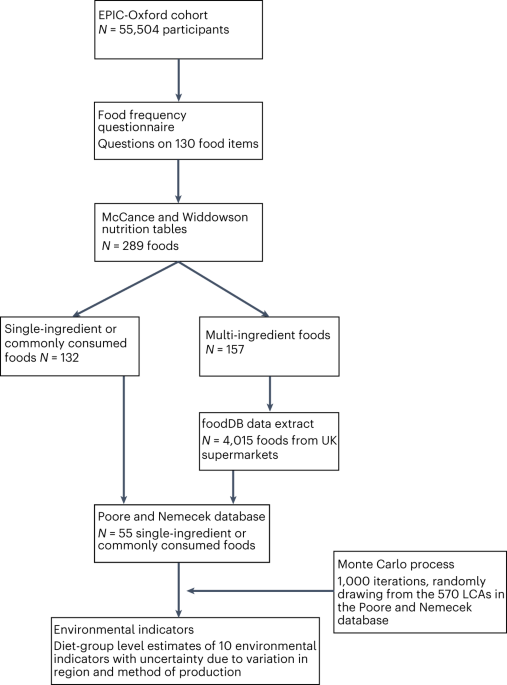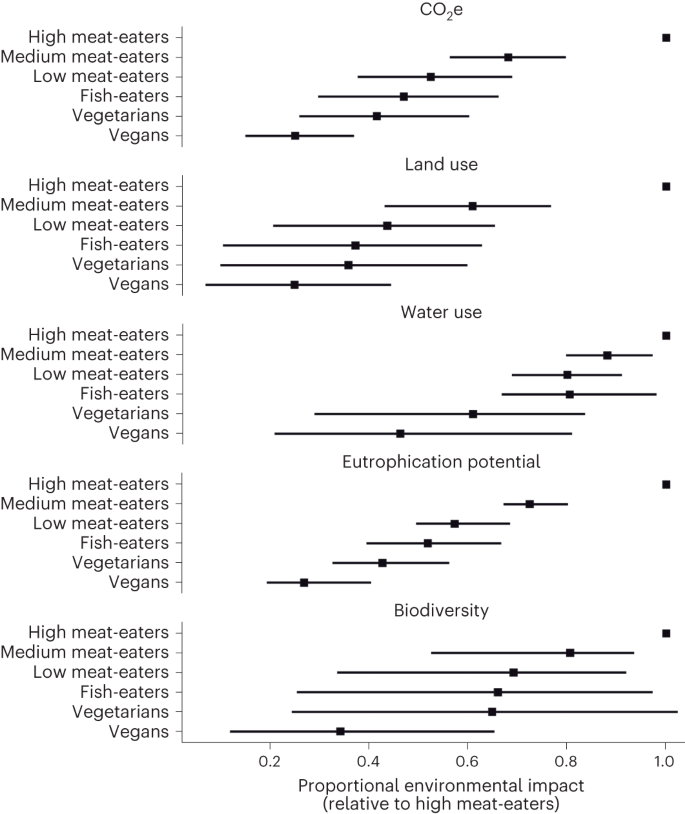- cross-posted to:
- hackernews@derp.foo
- green@lemmy.ml
- collapse@sopuli.xyz
cross-posted from: https://lemmy.world/post/5586412
Fig. 2: Relative environmental footprint from GHG emissions of diet groups in comparison to high meat-eaters (>100 g d−1).
Fig. 3: Relative environmental footprint from GWP100, land use, water use, eutrophication potential and biodiversity impact of diet groups in comparison to high meat-eaters (>100 g d−1).

PIty it isn’t broken down by type… I’ve seen similar research that suggests that beef accounts for a good 90% of the footprint of a meat eater. That’s important because you might be able persuade a few people to shift their diet to only vegetables but a whole lot more would be OK with just giving up beef.
I imagine the bulk of the beef eaters are in the high and medium meat eaters category (as you might expect). There’s a strong drip off then to the low meat eaters/pescetarians/vegetarians which tend to group together.
I’d class myself as a low meat eater and rarely eat red meat (I’ve also gone over to oat milk) - it’s better for you and because cows produce the bulk of the methane in our diet it helps with the environmental impact. I am pleased to see that completely getting rid of meat from my diet wouldn’t do that much to improve my carbon footprint unless I went vegan, which seems doubtful.
That said, the idea of our individual environmental footprints is largely an invention of the fossil fuel industry to shift the blame from themselves. The other day, I heard on the radio that if China switched off its coal-fired power stations and replaced them with gas, we’d be back on track to a rise of 1.5C, which makes me giving up the cow seem pretty small beans.
Ah well, it’s chickpea and spinach curry not for the planet but because it’s damn tasty.

But would that be just beef, or beef and milk and cheese and leather so all cow products?

It was broken down into individual elements, IIRC… found it…
https://philsturgeon.com/content/images/2023/04/foods-carbon-footprint-7.jpg
Meat Lover -> No Beef alone is 3.3 -> 1.7, or 80% of the saving you get by going vegetarian (so I was slightly misremembering on my original post).
Full article:
The difference in CH4 (methane) is quite startling as it is a much more potent greenhouse gas than carbon dioxide.

Not to sound rude, but this feels like a waste of time for me. Emissions created by meat consumption are only a small percentage of the emissions released from a person that are unrelated to eating such as driving, for example. And if the lockdowns during the pandemic showed something, it was that there was no significant change in emissions worldwide, the reason being that a vast, vast majority of carbon or other greenhouse gas emissions come from large and often multinational corporations, so stop bothering with a minor part within a minor part of where global emissions come from and focus on the big picture! I think getting rid of 20% of global emissions is worth a lot more than getting rid of 0.02%, don’t you think?
Indeed - see my other post below. The idea of an individual’s carbon footprint was just dreamt up by Big Oil to pass the blame to us. Large producers of carbon sorting their mess out would solve this overnight. Apparently, just switch replacing China’s reliance on coal with gas would put us back on track for a rise of 1.5C (or close to it, we may already be too late for that exact target). Any changes we, as individuals make, is a drop in the bucket compared to that. We should have had widespread carbon capture decades ago which would have bought us time to decarbonise our energy supplies but we can’t even manage that today.
The upside is that it helps us feel like we have some control (illusory as that may be) and giving up red meat could be a good idea on health and welfare grounds.




